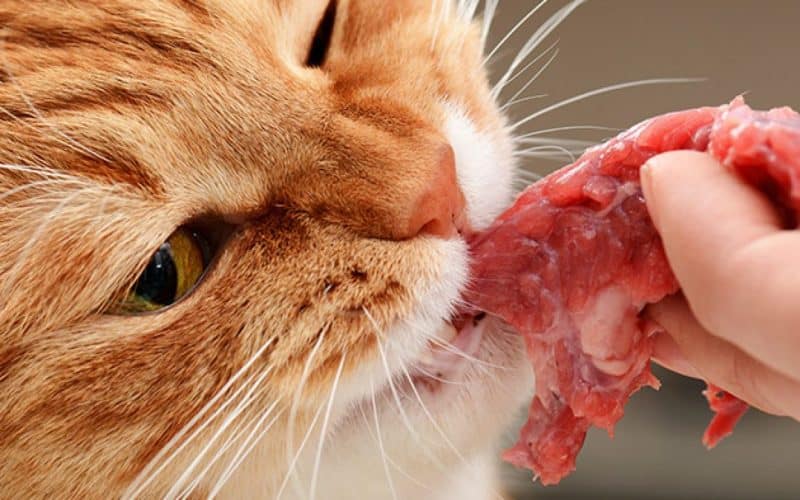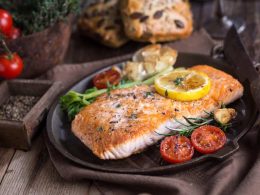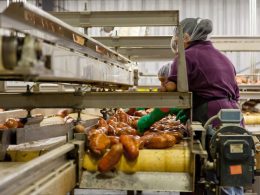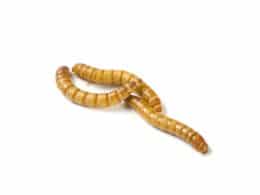Cats are one of the most popularly considered animals when people want to keep pets.
It could be for companionship, like help with stress or cause they are so cute, whatever your reasons may be, one thing is sure.
You love your cat and would not want to hurt it.
One of the ways to prevent harm is to know what human foods are not good for them to do not feel your cats from your plates and turn that loving gesture into pain.
1. Milk and Cheese
Your cats might love milk, but it isn’t something she should be taking.
Dairy products, in general, contain lactose, and since most cats are lactose intolerant, their digestive system may not be efficient in breaking down dairy products.
This inefficiency can result in vomiting and diarrhea.
2. Chocolates
Unlike dogs, cats are less likely to be interested in chocolates, but you must also be careful not to place them where your pets can reach them as they are as dangerous for cats as they are for dogs.
Chocolates contain a substance called theobromine, which takes more time to digest in cats, leaving room for the substance to build its toxicity level.
Theobromine can result in seizures, irregular heart rhythms, tremors, and sudden deaths in cats.
All types of chocolates are dangerous for your pets, but dark chocolates are worse as they have a higher concentration.
Humans are not at risk as we digest theobromine faster than dogs and cats. It is almost impossible for us to have theobromine poisoning.
3. Alcohols
This shouldn’t be on the list of foods you should not give your cats, it should have been pretty obvious not to give your pets but for the cat owners that might think to give their cats alcohol is fun, it is a death sentence. Do not keep alcohol at reachable points.
Cats’ system absorbs alcohol rapidly, making effects rapid. It can cause adverse brain and liver damage, coma, and death. As little as two teaspoons can put an adult cat in a coma, that’s how dangerous it is.
Best not to leave any room for ingestion, clear out tables after drinking and clean up drops, so your cats do not go licking them.
4. Onions and Garlic
All forms of garlic and onions and foods belonging to their family are a “must not” for cats. The disulfides and sulfoxides present in these substances act by breaking down the cat’s red blood cells after ingestion and causing anemia.
Other symptoms that can show onion poisoning are loss of appetite and weight, lethargy, pale gum, orange to red urine, weakness.
Though onions and garlic are noticeable poisonous when eaten in large quantities, eating small amounts regularly can also cause toxicity.
Sugar and Sweeteners: Generally, sugars add no nutritional value to a cat’s diet. Worse still, a type of sweetener known as xylitol is toxic for cats. It can be found in toothpaste, baked foods, candies, and gums.
Symptoms associated with its consumption ranges from seizures to vomiting to loss of coordination and then liver failure. Consuming xylitol causes a drop in blood sugar by increasing the insulin levels of your cats; your pet should not take products containing it.
5. Raw Eggs, Meats, and Fish
Your cats can be at risk of food poisoning from bacteria like Salmonella and E. coli as they are commonly found in raw foods. Some symptoms of poisoning caused by these bacteria are diarrhea, vomiting, lethargy. raw eggs, meats, and fish are foods you should not give your cats.
Another issue with feeding raw eggs to your cat is the interference with B Vitamin biotin absorption caused by avidin, a protein present in raw egg white. Thiamine is destroyed by an enzyme present in raw fish and can result in convulsions and coma.
6. Caffeine
Caffeine is one of the foods you should not give your cats; ingestion of large quantities of caffeine can be hazardous for your cats. Caffeine is contained in energy drinks, tea, soda, coffee, and some cold medicine.
Intake can lead to muscle tremors, seizures, breathing difficulties, hyperactivity, and increased heart rates. Caffeine poisoning has no antidotes and can be fatal, take extreme caution, and do not keep caffeine within your pet’s reach.
7. Grapes and Raisins
Research has shown that it takes a small number of grapes and raisins to get your cats vomiting and hyperactive. Other symptoms which can take a day to present themselves are abdominal pain, reduced appetite, lethargy, and diarrhea. It can also put your cat at risk of kidney failure.
8. Fat Trimmings
Fats are high in calories and can cause obesity in cats. Pancreatitis is also another illness cats that eat fat trimmings are at risk of. Both cooked and uncooked fats cause diarrhea and intestine upsets and should be avoided altogether. So fat trimmings are definitely on the list of foods you should not give your cats.
9. Liver
Small quantities of the liver on different occasions do not harm lots of cats, but too much of it will result in high vitamin A content in your pet’s system. This results in osteoporosis, deformed bones, hypervitaminosis A – an imbalance of vitamin A. Vitamin A toxicity can be fatal.
10. Yeast Dough
One of the properties of yeast is to rise or swell. A cat that eats dough is at risk of having it swell inside its body, which can cause a digestive obstruction and stretch the abdomen. Also, yeast ferments to give off carbon dioxide and alcohol, and we have already explained why alcohol is not suitable for cats above.
11. Mushrooms
Mushrooms in small quantities might be safe, but some varieties are toxic and should be avoided.
Symptoms take six to twenty-four hours to manifest and might be too last. Liver failure, drooling, and vomiting are some of the symptoms it causes.
12. Dog Foods
Though humans can not consume dog food, it is an essential part of this list. Cats should not be fed with dog foods as dogs and cats have different nutritional needs.
Feeding your cats, dog food will result in nutrients deficiency.
With the long list above, it’s easy to wonder what you can feed your cats without having to worry.
What foods are safe for cats?
Corn, oats, avocados, millet, broccoli, cucumber, green peas, carrots, pumpkins, apple, banana, watermelon, cooked eggs, boneless, and skinless chicken. You can talk to your veterinarian for more.








